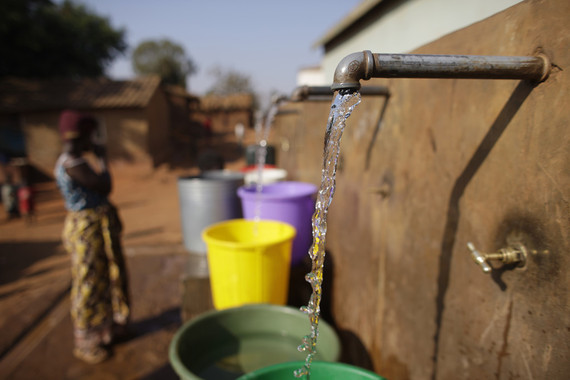Last month, the City of Detroit's Water and Sewerage Department began to shut off water service for around 3,000 customers a week, people who have fallen behind on payments by more than $150 or 60 days. It's no coincidence that Detroit is one of the cities hardest hit by recession, unemployment and foreclosures in the United States, and I can't help but notice parallels to the work that the international development nonprofit, WaterAid does in 26 of the poorest countries in the world.
Sadly, the lack of access to safe drinking water is not new. For 748 million people, getting safe, affordable drinking water is one of life's most dangerous and time consuming challenges. What is new is that those fears and risks are suddenly hitting close to home.
I spend a good deal of time thinking about these issues and their implications for people worldwide. In Detroit, as in the rest of the world, the poorest and most vulnerable people are the most affected. These are the people least likely to have access to safe drinking water and sanitation, to the protections of their government, or to resources for advocating on their own behalf. These are some of the reasons why it matters:
#1 The human right to water is at stake
Water is the stuff of life. Water, and the toilets and sanitation systems it helps maintain, are recognized by the international community as a human right essential for the full enjoyment of life. In many places where the only source of water is miles away, accessible water can make or break a girl's education; it is often central to adequate housing, dignity and employment opportunities, too. Everyone, without discrimination, is entitled to safe, accessible and affordable water and sanitation. This doesn't mean free, but it does mean affordable to all.
# 2 Our health is at risk
A lack of safe water and toilets has a direct impact on the spread of disease, the quality of our lives and the burden on health care providers. Water is essential to public health, especially when combined with toilets, hygiene practices like handwashing, and waste management. When these basic necessities are not available, health risks run high. Safe drinking water can help prevent some of the leading causes of illness and death in the world, including diarrhea, which kills 1,400 children under age five every day.
#3 Good governance is key
Governments have the responsibility to protect -- though not necessarily provide -- human rights, including the right to water and sanitation. There is no one-size-fits-all model for water and sanitation, and fees for service are often both acceptable and preferred. Even in the poorest communities where WaterAid works, residents often choose a fee-based system in order to recover maintenance costs as a community, establish self-reliance and make sure that a precious resource is valued as exactly that: precious. But when fees for something so basic and life-saving are genuinely out of reach, it's time for governments to step in. It's a matter of good economics, good public health, and good government.
#4 Your voice can help
Water governance in the U.S. is well-intentioned and one of the most developed in the world. But Detroit is also showing us that it's still imperfect. Even so, we don't have nearly as far to go as many poor countries, many of which lack systems to properly finance and oversee water and sanitation infrastructure within their borders. That is where the United States Agency International Development (USAID) and you come in.
USAID has been successfully undertaking cost-effective water, sanitation and hygiene programs (WASH) for many years. Building on the lessons learned along the way, Congress is now actively working to pass the Senator Paul Simon Water for the World Act. The bipartisan, cost-neutral bill will improve US Government-supported WASH projects, using existing funds, so that US taxpayer dollars are targeted to support the people most affected by poverty, build the capacity of local governments to carry the work forward, and boost our collective knowledge so that we can keep improving our impact.
Even as things go awry in Detroit, we are learning. With more than 80 cosponsors from both sides of the aisle, Water for the World is a critical opportunity to apply that learning, without spending any new taxpayer money, to help reduce the number of people living without safe drinking water and make sure those reductions -- and their benefits -- last.
Everyone, everywhere deserves the right to safe drinking water and sanitation. Please join me in showing solidarity with the struggle for water by lending your voice to the cause. Tell Congress you care by asking them to support safe drinking water for all, today.
